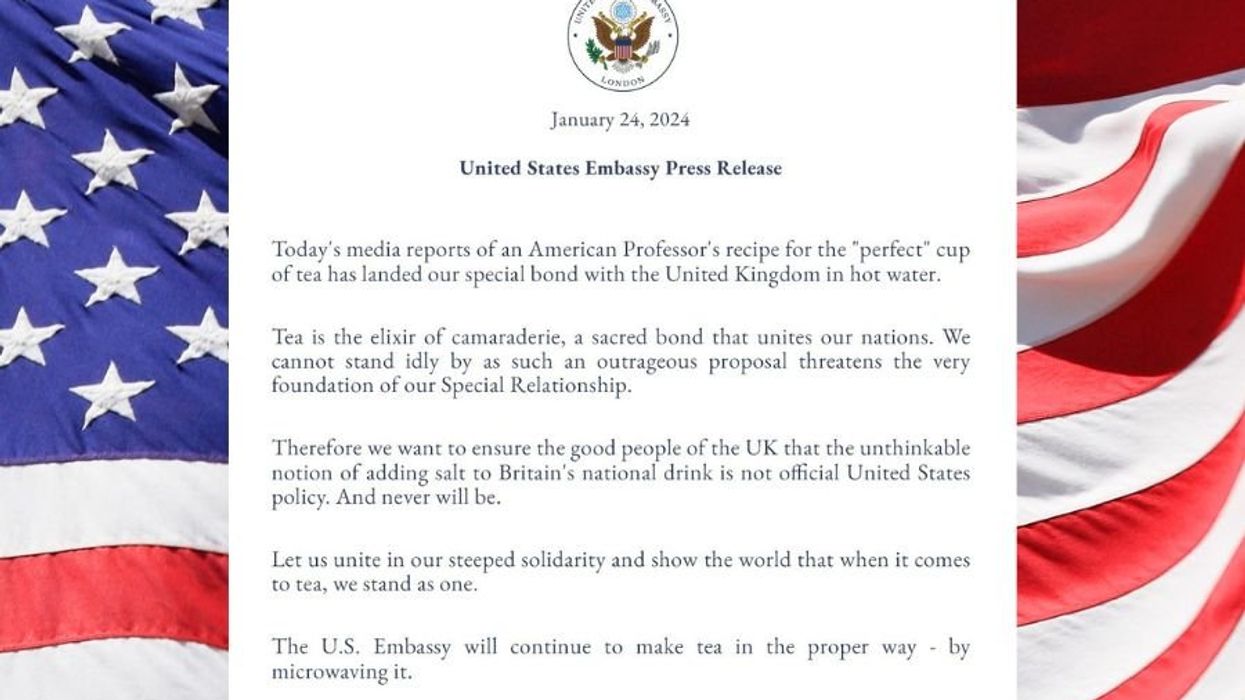
If there’s one thing British culture is universally known for, it’s tea. And if there’s one thing Americans are known for in Britain, it’s mucking up tea.
Admittedly, Americans’ relationship with the U.K. and its tea is a bit…complicated. After all, it was Britain’s taxation of imported tea that served as both a symbol and catalyst for the Revolutionary War, made famous by the so-called Boston Tea Party in 1773. (For those not steeped in American history, colonists famously dumped tea from British ship in Boston Harbor overnight in protest over being taxed without representation. They also tried to pin it on Native Americans, dressing as Mohawk Indians to disguise their identities, but that’s another story for another time.)
Our complicated tea relationship just took an unexpected turn, as an American scientist dared to suggest that the secret to a perfect cup of tea is to add a bit of salt to it, which naturally caused the entire United Kingdom to lose its everlovin’ mind.
Michelle Francl, a chemistry professor at Bryn Mawr College in Pennsylvania, argues in her book, “Steeped: The Chemistry of Tea,” that sodium in salt can counteract the chemical process that causes tea to taste bitter, to which the British say, “Rubbish! Poppycock!”
“A scientist from the country where you can find tea being made with lukewarm water from the tap claims to have found the recipe for a perfect cuppa,” British newspaper The Guardian quipped.
The Brits take their tea-making seriously, using a kettle to heat the water to just the right temperature and steeping their tea for a set amount of time, while Americans dare to pop a mug of water in the microwave and haphazardly leave their tea bag for however long they feel like. (It’s kind of a perfect example of ingrained American rebellion against monarchical tradition, really.)
Folks at the U.S. Embassy in the U.K. recognized that salt-in-tea controversy had landed the nation in some hot water, so they issued an official response. And naturally, it includes some lighthearted trolling of our friends across the pond.
“An important statement on the latest tea controversy,” the Embassy wrote on X, with an image of an official United States Embassy Press Release.
It begins by explaining that media reports of an American professor’s “perfect” cup of tea recipe “has landed our special bond with the United Kingdom in hot water.”
“Tea is the elixir of camaraderie,” it continues, “a sacred bond that unites our nations. We cannot stand idly by as such an outrageous proposal threatens the very foundation of our Special Relationship.”
Ohhh, somebody at the Embassy had their cookies today.
“Therefore we want to ensure the good people of the UK that the unthinkable notion of adding salt to Britain’s national drink is not official United States policy. And never will be,” reassured the Embassy. “Let us unite in our steeped solidarity and show the world that when it comes to tea, we stand as one.”
A perfectly diplomatic response, followed by the ultimate American tea troll:
“The U.S. Embassy will continue to make tea in the proper way—by microwaving it.”
Oh yes, they did.
Now, some may lament that an official government agency would have the time to troll an entire country over a cup of tea, but it’s not like the U.S. Embassy in the U.K. is on a complex diplomatic mission. Our countries have been close friends and allies for a long time, despite our fight for independence in the 18th century, so a little friendly banter is just what we should expect.
For their part, the U.K. government officially responded with a quintessentially understated retort.
“We appreciate our Special Relationship, however, we must disagree wholeheartedly… Tea can only be made using a kettle.”
The U.K. Defence Journal offered a bit stronger of a reaction, writing, “The United Kingdom will be declaring war on the United States.”
Perhaps we can all sit down and discuss this civilly…over a cup of microwaved tea.









 Fans (50%)
Fans (50%)
